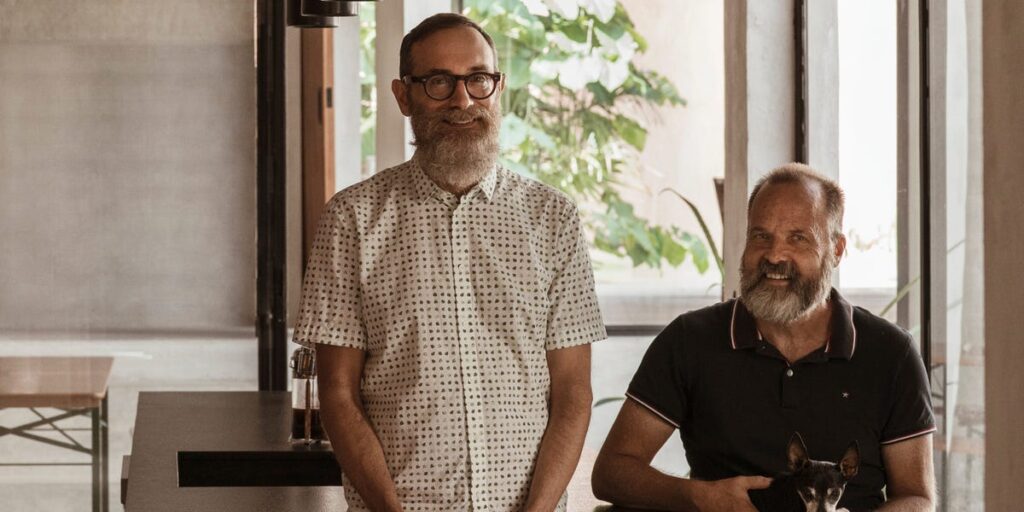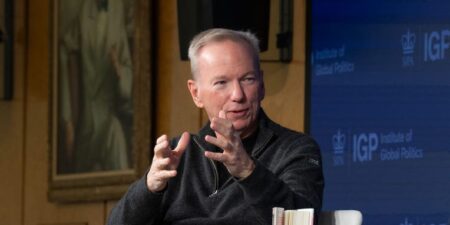- My husband and I made reasonable salaries living in NYC but weren’t happy about retirement.
- When we started looking abroad, we realized our money would go a lot farther.
- We moved to Mexico in 2020 into our dream house and now feel far more secure about retirement.
I used to dread retirement calculators. It was possible to get the numbers to come out OK if my husband and I blurred our vision a little, were optimistic about our return on investments, and figured out how to save at least somewhat more each year.
However, if there was an expensive, unexpected setback — and the older I get, the more I realize that you have to expect unexpected financial blows — the numbers would no longer add up.
But there was a way, potentially, to reset the numbers, and that was to retire abroad.
After looking at multiple countries outside the US, we settled on Mexico
We started looking at options, investigating residency requirements, the cost of real estate, and the availability and cost of medical care.
We eventually settled on Mexico, a country that’s long been a favorite of American retirees where an estimated 1.6 million already live.
Based on our calculations, our money could last longer in Mexico than in some other countries we were considering, such as Spain and Canada.
Plus, it was closer to the US, which was important to both of us, as we have parents in California and Florida who we want to check in on regularly.
After a trip to Mérida in 2018, the capital of the state of Yucatán in southeastern Mexico, we realized the housing expenses there would significantly improve our financial situation.
We had been looking at small apartments in Bushwick, Brooklyn, for about $600,000. But we could easily afford a nice house with a pool and several bedrooms in Mérida, which were going for $250,000 to $300,000 at the time.
It was too good to pass up. We decided then to move from the United States to Mexico.
We moved to Mexico ahead of retirement so we could enjoy it more
We moved to Mexico before retiring because we thought the transition to retirement in another country would be easier if we had already lived there.
We figured that if we moved abroad in our 50s, we’d have time to explore our new home and feel settled rather than trying to uproot ourselves in our 60s.
I was also aware of my parents’ path. They, too, had considered retiring in Mexico but waited too long until the upheaval of moving abroad late in life became too formidable.
We bought an abandoned house for $50,000 and made it our dream home
We found a house that had been abandoned, though was still in relatively good condition, in Mérida’s historic center and purchased it for one million pesos, roughly $50,000, in 2019.
We then found a contractor who gutted it and built a new addition based on designs my husband, Marc Perrotta, drew up.
Ultimately, the renovations cost $220,000 and took a year to complete.
During the first six months, we stayed in NYC, keeping updated with the contractor over regular Zoom calls. For the last six months, we moved into a rental in Mérida, which allowed us to visit the site regularly.
Our patience was rewarded because, in the end, we now have our dream house.
We make less money in Mexico, but our cost of living is lower
Our combined income is less than it was when we were living in New York. But the drop in our cost of living more than compensates for our lower income.
For example, health insurance is significantly lower here. For 2024, we paid $2,221 for an insurance policy that covered both of us for the entire year. Back in NYC in 2020, I was paying $543 a month for a less extensive, very basic Oscar plan — and it only covered me.
Our taxes are also much less, in part thanks to the Foreign Earned Income Exclusion, which states that as long as you don’t spend more than 35 days in the US, you don’t need to pay income tax on the first roughly $120,000 you earn while working in Mexico. We’re also lucky enough not to have a mortgage and paid $125 in real estate tax bills this year.
Daily expenses, like food and gasoline, are also lower than in NYC, though not by as much as housing and healthcare.
The future is still uncertain, but we feel more secure now
Looking ahead we have some concerns, though none that feel overwhelming.
On the downside, Mexico has fewer assisted-living facilities than the US. On the plus side, the cost of hiring home care is lower and should be accessible if needed.
While we’re not Medicare age yet, we’re concerned about navigating the challenges that other expats discuss on Facebook pages and what we’ll do when the time comes in a decade. But the Medicare landscape may look very different by then, so we’re just keeping an eye on it, for now.
In the end, we have a house paid for in full and as long as Social Security still exists in ten years, we should be able to live off of those payments, something that is difficult to do for many Americans.
We’ll be able to reserve our modest nest egg for emergencies and the occasional frivolous expenditure. And now, looking at a retirement calculator no longer sends me into a panic.
Read the full article here















